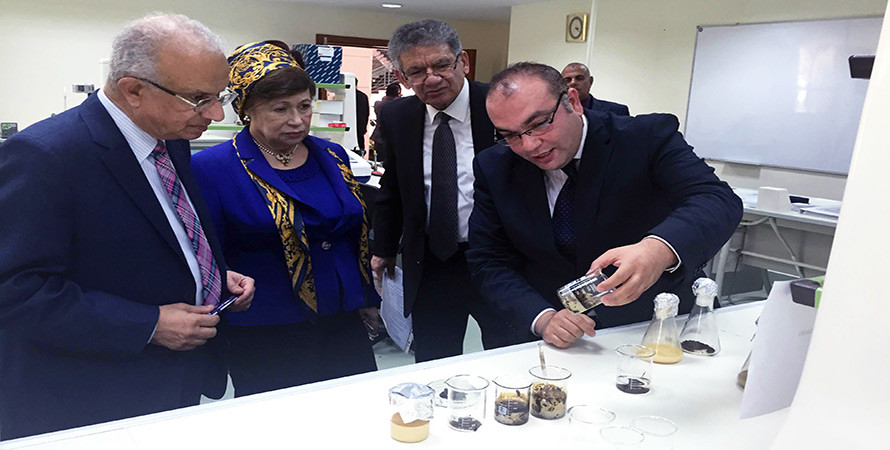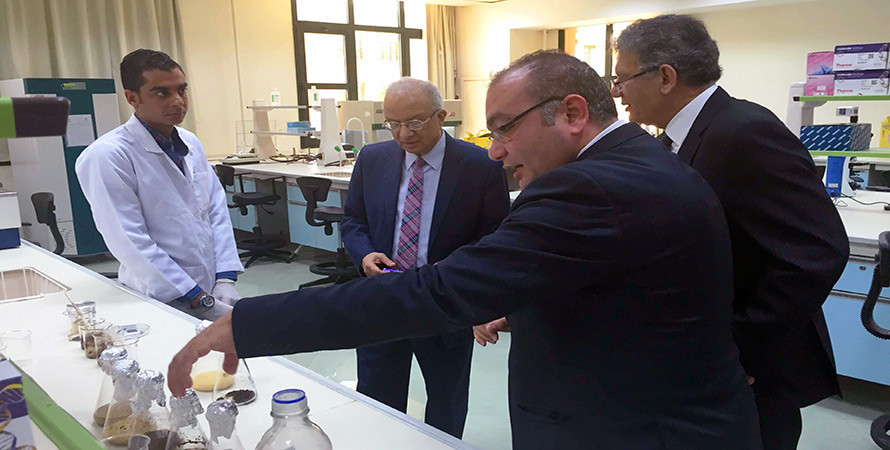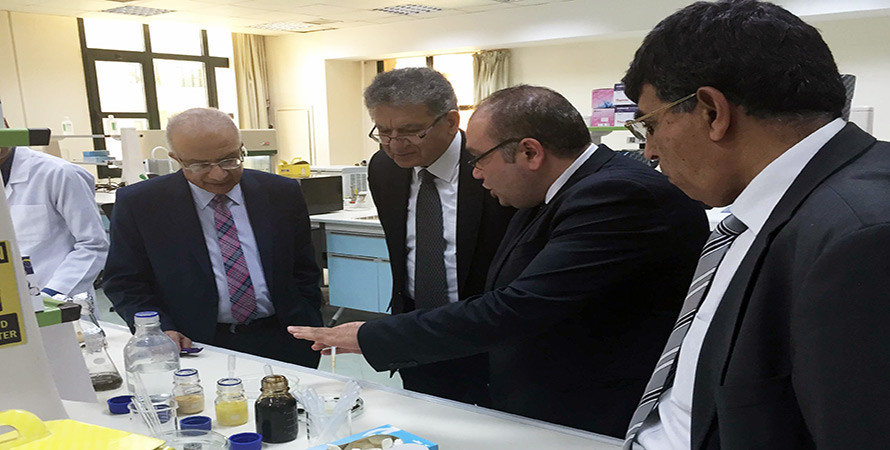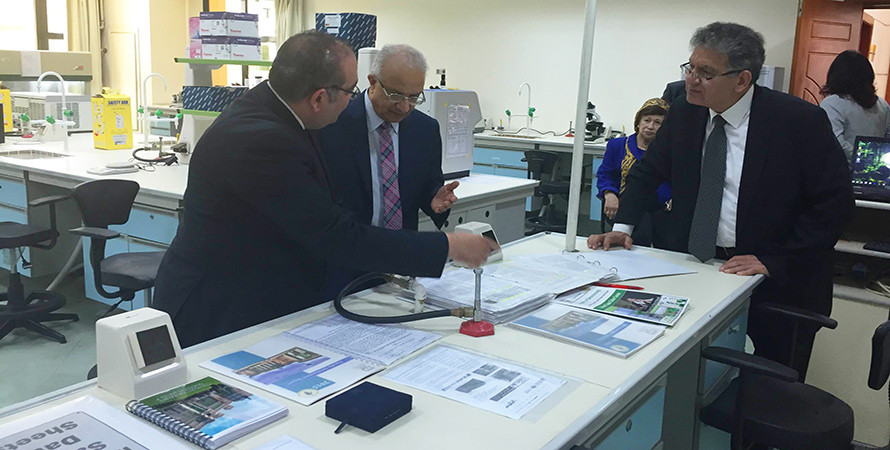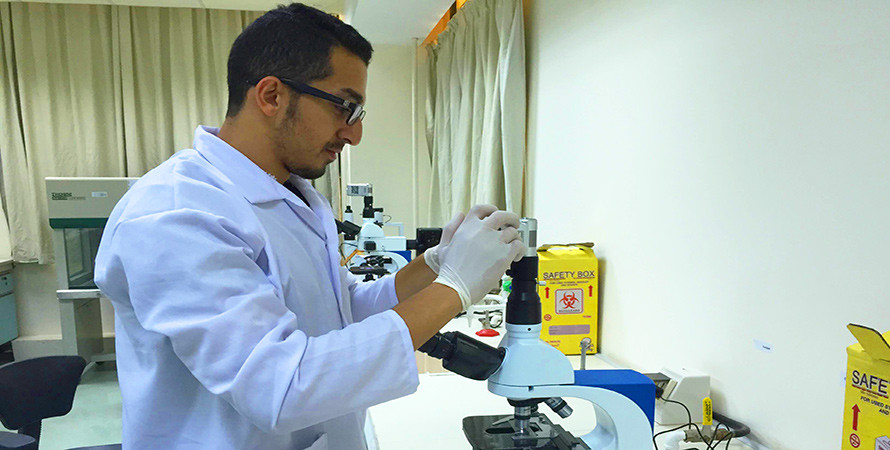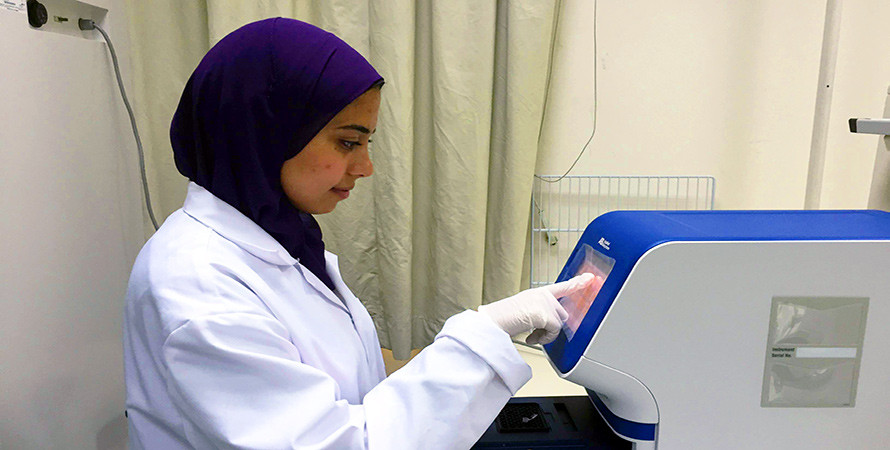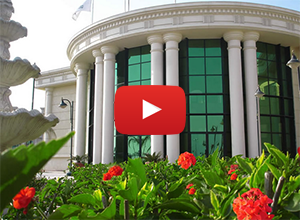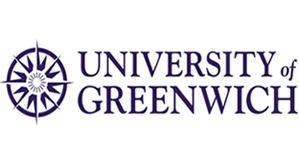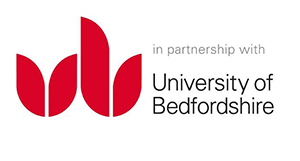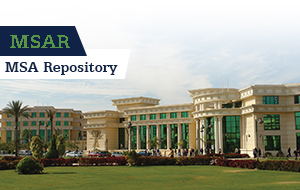Research Center
Overview:
October University for Modern Sciences and Arts (MSA University) begins a qualitative leap in the areas of scientific research, through introducing its biotechnology research center. The center objective is to conduct scientific research using molecular biology and genetic engineering techniques in the fields of medical and pharmaceutical, biological, agricultural, industrial and environmental. The center aims to increase the dissemination of scientific research and provide scientific services to MSA faculty members, assistants stuff and the scientific community in Egypt. The biotechnology center will perform and offer support to scientific experiments that is directly linked to faculty members research points, topics related to M. Sc. and Ph. D. studies inside the MSA University, and to serve the state and society. MSA biotechnology research center is committed to maximizing the benefits of biotechnology research within the MSA University and scientific society in Egypt. The center facilitates high quality, comprehensive, multidisciplinary research in various fields of biotechnology techniques. Through the implementation of cutting edge molecular biology techniques, Bioinformatics applications and tissue culture techniques, the center will provide opportunities for creativity and innovation, which enhances the role and place of October University for Modern Sciences and Arts in scientific research in the field of biotechnology as well as its academic role.
Vision:
Biotechnology research center at October University for Modern Sciences and Arts (MSA University) achieves excellence in the field of scientific research at local, regional and global levels, in a climate characterized by independence, efficiency and accuracy which contributes to community service and achieve academic excellence.
Mission:
Biotechnology research center at October University for Modern Sciences and Arts (MSA University) works on solving the problems of society and contribute to the scientific development in addition to:
Goals of the Biotechnology research center:
Location and working date:
Biotechnology Research center building H room 316. The center is open from Sunday to Thursday from 9 a.m
Team:
| Prof. Ayman Diab | Faculty dean, and board chairman. |
|---|---|
| Dr. Amr Ageez | Director of center. |
| Dr. Ahmed Nada | member and quality control specialist. |
| Dr. Gehan Safwat | member and training specialist. |
| Dr. Ashraf Bakkar | member and biosafety specialist. |
Services:
Biosafety:
Biotechnology Research Center is committed to apply the biosafety requirements within the biological laboratories working in the field of research or diagnostics; to reduce the biological contamination on human, animal, environment and food safety. Biotechnology Research Center is committed to enhance the capabilities of biological laboratories concerned with the diagnosis and scientific research, through continuous training of its employees, the application of biosafety policies to limit and control the biological risks and adherence to precise safety and health regulations and the safe disposal of biological waste.
Scientific research ethics:
Biotechnology Research Center is committed to take all the necessary actions to prevent the transfer of scientific research and fight plagiarism.
Quality control and accreditation systems:
Biotechnology Research Center is committed to adopt and implement the quality/certification ISO 17025 Systems. The centers is committed to the complete of the necessary requirements and apply for a quality/certification ISO 17025 certificate.
Where to go after Graduation
If you cannot view the below document, please click here | Download Where to go after Graduation.
Alumni of Faculty of Biotechnology
Contact Email: This email address is being protected from spambots. You need JavaScript enabled to view it.
Admission Requirements for Faculty of Biotechnology
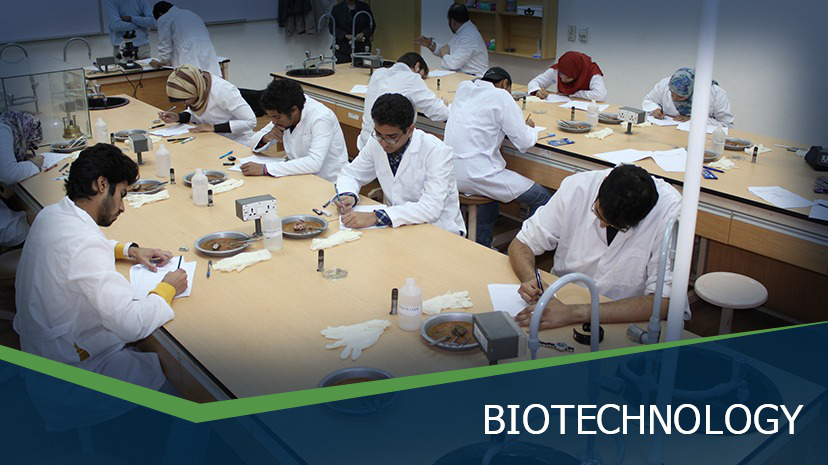
* Other foreign certificates including certificates from Arab countries are evaluated at the Admission Office in accordance to the regulations set by the Egyptian Ministry of Higher Education.
Programme & Course Specifications documents
Biotechnology Programme Document 2022
Biotechnology Programme Specifications 2022
Biotechnology Curriculum 2015-2016
Reasons to Join Faculty of BIOTECHNOLOGY
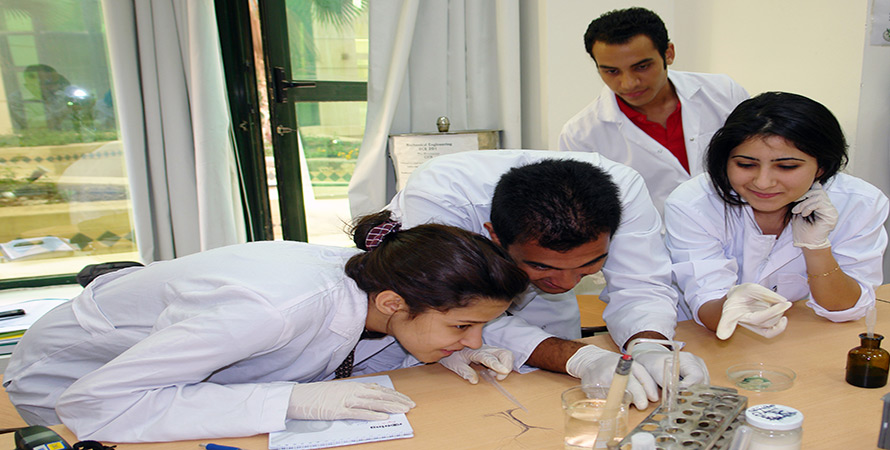
With the world population booming, and the subsequent demand for food and fuel, intelligent agriculture and a cleaner, greener environment are just some of the key global challenges facing us today. Biotechnology will provide you with the opportunity to enhance your research skills in using biological principles and systems to create new products, services and industries.
Biotechnology encompasses the pharmaceutical industry, including innovations in drug and vaccine design and regenerative medicine, as well as the biofuels industry and work in carbon sequestration and next-generation fuel production. Biotechnology will equip you with skills and knowledge that are very attractive to prospective employers.
A computer geek, a math nerd, a biology expert, all of them can have their concrete space in this field. A computer guy can delve into informatics in biology (to say the least), while a math geek can try his hand at bio statistics. I have seen instances where students who hate biology have taken a liking for it in the course of time. So no preconceived notions but a strong will to study would suffice.
Recombinant DNA technology is used for production of specific enzymes, which enhance the rate of production of particular range of antibodies in the organism. The hormones such as somatostatin, insulin and the human growth hormone can be synthesized easily and cheaply.
One of the best known applications of genetic engineering is that of the creation of genetically modified organisms (GMOs). Future applications of GMOs include bananas that produce human vaccines against infectious diseases such as Hepatitis B, fish that mature more quickly, fruit and nut trees that yield years earlier, and plants that produce new plastics with unique properties.
Defective genes in an organism cause genetic disorders. If a defective gene could be identified and located in a particular group of cells – it could be replaced with a functional one. The transgenic cells are then planted into the organism, resulting in a cure of the disorder.
DNA fingerprints are useful in several applications of human health care research, as well as in the justice system. DNA fingerprinting is used to diagnose inherited disorders in both prenatal and newborn babies in hospitals around the world. DNA fingerprint information can also help in developing cures for inherited disorders. DNA fingerprints helps to link suspects to biological evidence – blood or semen stains, hair, or items of clothing – found at the scene of a crime and help in solving crime.
Due to the revolutionary development of biotechnology during last couple of decades agriculture has drastically advanced. Sensational achievements were made in both plant cultivation and animal husbandry.
Improvement in disease control, efficiency of reproduction, yields of livestock products i.e. meat, milk, wool, eggs, composition of livestock products i.e. leaner meat, feed value of low quality feeds i.e. straw; are some of the applications of biotechnology.
One of the major scientific revolutions of the twentieth century was the breaking of the genetic code and the development of tools that enable scientists to probe the molecules of life with incredible precision. Now, in the twenty-first century, these developments in biology are being married with the use of ever-increasing computer power to help us face the challenges that the new century brings. Bioinformatics is the name given to the new discipline that has emerged at the interface of biology and computing.
From new drugs that address our medical needs and fight epidemics and rare diseases, to industrial processes that use renewable feedstock instead of crude oil to lower the impact on the environment and crops that are able to grow in harsh climatic conditions and ensure safe and affordable food, biotech can and will pay economic, social and environmental dividends.
There any many examples include the production of gasoline from ethanol which in turn is produced from sugar; the production of insulin using recombinant DNA technology; the production of hepatitis B vaccine using recombinant DNA technology and the extraction of copper using mineral leaching bacteria. The alternative inputs are oil for gasoline, porcine prancreases for insulin, human blood for hepatitis vaccine, and the conventional mining techniques for copper.
A wide variety of microorganisms are now being employed as tools in biotechnology to produce useful products or services. Raw materials can be converted to useful finished products both by ordinary chemical processes and by biological means. Generally, the costs of chemical conversion are quite high as the reactions require high temperature or pressure. In contrast, biological alternatives, using microbes or cultured animal or plant cells, operate at physiologically normal conditions of temperature, pressure, pH, etc..
In future biotechnology will be accredited for some revolutionary technology. Recent advances in bioenergy, bioremediation, synthetic biology, DNA computers, virtual cell, genomics, proteomics, bioinformatics and bio-nanotechnology have made biotechnology even more powerful. Recent discovery of conduction of electricity by DNA and its behavior as a superconductor has opened a new realm in modern science. In future biotechnology will have profound impact in world economy. Biotechnology is a golden tool to solve some of the key global problems like global epidemic, fatal diseases, global warming, rising petroleum fuel crisis and above all poverty.
Dean's Welcome Note.
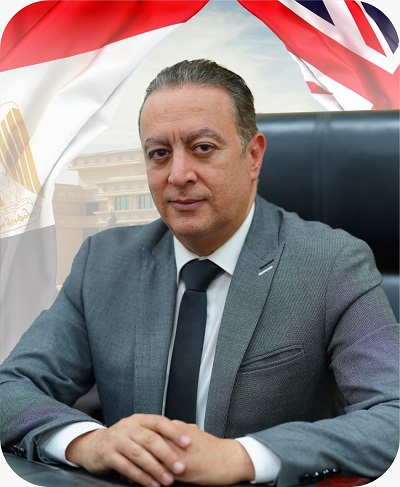
I am glad to welcome you to the faculty of Biotechnology at October University for Modern Sciences and Arts (MSA).
Our Faculty takes it upon itself to offer high quality educational programs and supporting activities. It earnestly seeks to deliver the best to our students and is very keen to provide them with the necessary guidance to enlighten their way to the future. Backed by outstanding laboratory facilities, our undergraduate academic programs and related activities assure well-prepared, future leaders. Biotechnology is simply a technology based on biology that helps to develop technologies and products that better our lives and safeguard our planet from degradation. Through harnessing biological processes, it provide breakthrough products and life changing technologies to fight diseases, lower environmental pollution, feed the hungry, and use less and cleaner energy, and have safer and efficient manufacturing processes.In addition to the outstanding educational programs, the Faculty Biotechnology offers to its students many academic activities. These include field trips, industrial projects and graduation projects, to name only a few.
Our dynamic curriculum is carefully designed to enable the students to pursue new insights and trends in Biotechnology and related fields. We work closely with campus academic partners and cross-disciplinary initiatives, such as the AGERI, Hospital 57357 and the Stem cell center.
The Faculty’s approach to teaching is research- led, entertaining hands-on and multidisciplinary, and drawing on the expertise of faculty's educators in related disciplines such as Agriculture, Biomedicine and basic sciences.
The Faculty of Biotechnology enjoys an alumni network that serves as an invaluable resource in mentoring students and availing networks of colleagueship and friendship among graduates.
Welcome again to the Faculty of Biotechnology at MSA website where you can be acquainted with the programs and people of this respectable institution. I do hope that you enjoy your virtual visit through this website. I hope that you spend time at our real campus and connect with our exciting, creative, welcoming, and inclusive community
Professor/ Ayman Diab.
Dean of the Faculty of Biotechnology.
MSA University.
Validated by:
Who's Online
We have 1052 guests and no members online
MSA University Campus Map
Main Office - 6th Oct. Campus
26 July Mehwar Road intersection with Wahat Road, 6th October City. Egypt.
Tel. : 3837-1113
Tel. : 3837-1115
Tel. : 3837-1516
Tel. : 3837-1519
Admission Office: admission@msa.edu.eg
Graduates Affairs: sgaffairs@msa.edu.eg
Mobile: 01270447292
Hotline : 16672
International Hotline: 002-0216672

